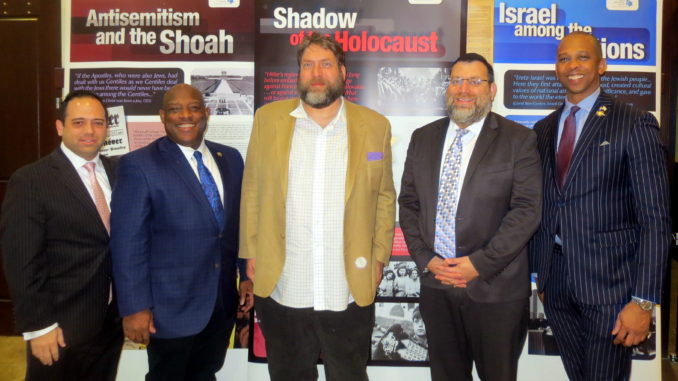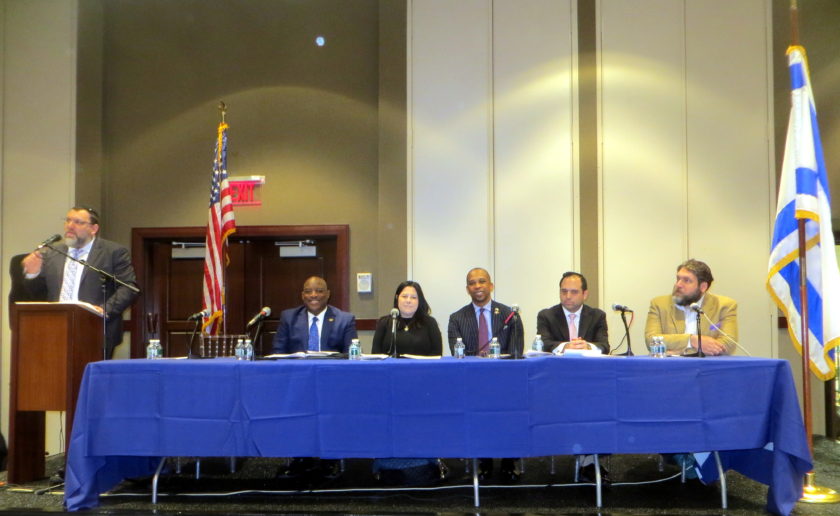
ENGLEWOOD, N.J.—“Stand Up/Speak Out: Standing up to Anti-Semitism and Hate”—a Feb. 9 forum hosted by Congregation Ahavath Torah in Englewood—brought together distinguished community leaders representing different constituencies and varied perspectives.
The topic is most timely because last year the Jewish community in the United States experienced near-historic levels of anti-Semitism, with attacks against Jews and Jewish institutions doubling in number, according to new data from the Anti-Defamation League.
The panelists at the Congregation Ahavath Torah forum were Englewood Councilman Michael Cohen, who is Eastern Director of the Simon Wiesenthal Center; Sarri Singer, founder/president, Strength to Strength; Bergen County Sheriff Anthony Cureton; New York State Assemblyman Walter Mosley: and Congregation Ahavath Torah Senior Rabbi Chaim Poupko.
Israeli-American Journalist Liel Leibovitz served as the moderator.
The event was organized by the Israel Engagement Committee of Congregation Ahavath Torah, which is chaired by Irene Gottesman, Lynn Karpo-Lantz and Aviva Shuman Banner.
Gottesman said, “Whenever you host a forum, people will look at the turnout and equate that with how concerned the relevant community is.”
“It’s important to see us come out en masse, to see the level of our concern,” said Gottesman. “We have a lot of questions and they can be answered by professionals, so we have a clear understanding of what is happening and the needs of those on the front lines of combatting it.”
To that end, Rabbi Poupko had personally invited clergy from all religions and denominations to the event, and it was attended by over a hundred people from throughout Bergen County and New York City.
The goal of the panel discussion was to educate the audience on many misunderstandings as well as provide tactics to deal with the hate that is rising in the world today.
Cohen said, “I am very proud to participate in a forum which will bring to my home community a clearer picture of the realities of the spiking anti- Semitic hate crimes in our region and can more importantly help provide participants from across the entire city with empowering strategies to combat hate and promote the unity among us all.”

As people entered the synagogue on Broad Avenue in Englewood beginning at 7 p.m., they viewed the world renowned exhibit that was on display—“People, Book, Land—The 3,500 Year Relationship of the Jewish People with the Holy Land,” co-sponsored by the Simon Wiesenthal Center and UNESCO. The dramatic array of panels that depict the history of Israel and the Jewish people started at the United Nations and is currently making its way around the United States.
At 7:30 p.m., Poupko welcomed everyone and set the tone for the discussion.
He stated, “People have inherent feelings of fear, mistrust and hate, but humanity has a sense of spirituality that drives us to rise above this, to embrace the notion that we are all created in the image of God and to pursue peace and friendship with those who look different than us.”
John Kelly, a prominent Englewood citizen and member of the Englewood Board of Adjustment, read a message from Mayor Michael Wildes, who was out of town and unable to attend the forum.
“Recent tragedies, such as the killings in Jersey City, underscore the need to address anti-Semitism and all other hate-fueled speech and activities head on, for all of us, not just within the Jewish Community. Speaking openly in the wake of these events, as well as recognizing the presence of bigotry in our day-to-day lives—whether it is directed towards Jews, Muslims, African Americans or Latinos, the LGBTQ community or any other targeted people—is the only way we can hope to disuse the hatred and diminish future incidents. Trusted leaders such as yourselves, of different faiths and backgrounds, coming together to say in unison that this is not a Jewish problem, not a black problem, but a human problem that impacts us all, is a source of inspiration.”
Liebovitz then introduced the panelists. Each one spoke about their background and position statement about the issues at hand.
Singer recalled her ordeal as a victim of a terrorist bombing while riding a bus in Israel in 2003.
“It’s important that people think outside their comfort zone and think globally, and that we call out acts of terrorism,” she said, pointing out that in the U.S. hate crimes are often called “shootings,” when they are, in fact, acts of domestic terrorism.
“We need to have these conversations and change the narrative,” Singer said.
Mosley pointed out that, “Hate is not new; it has been around for thousands of years, and we all have a role to play in re-directing history. We have to communicate with one another and perpetuate positive characteristics that we want to see in our communities.”
As an example, he cited the great support that the Jewish community gave the African American community during the civil rights movement.
“Without that support, we would not be here today,” Mosley said.
Cureton extrapolated on that statement by saying, “We have to ask ourselves, ‘What can we do, and what are we willing to give up for the benefit of the next generation?’”
The panelists then tackled a number of questions posed by Liebovitz, followed by questions from audience members. A key question was, “What is the proper response to someone who posts anti-Semitic or racial stereotyping on social media?”
Cohen responded first by citing a recent instance in which an online hate group in Ocean County was thrown off of Facebook. He contended that when private entities spread anti-Semitism on social media, whether intentionally or unintentionally, the public should report and complain, so that these private entities realize that it affects their bottom line.
On this issue, Leibovitz posed a question to Cureton about law enforcement’s position on free speech on social media. Cureton replied that, “In order to advance civilization, we need modern tools such as social media, but we need safe parameters around it. In some instances, people have slipped up and revealed their actions on social media, so that helped start an investigation.”
Liebovitz went on to ask Cureton how he uses the power of law enforcement to combat hate crimes.
“Arresting people is the easy part. But, we have to understand what is actually happening in the community, what the community needs to feel safe and how we can protect the community in order to get the job done. I have spent a lot of time learning about the Jewish community as well as other ethnic groups.”
Liebovitz asked the panel, “How can we get everyone involved in the discussion, not just the people who are here tonight?”
The panelists all agreed that a key to combatting anti-Semitism and hate is for people of different faiths and backgrounds to have face to face discussions and activities that unite communities.
Poupko summed it up by saying, “Besides the authorities and religious leaders, there needs to be a grassroots effort, including students, to drive the conversation and connect with other communities.”
Singer agreed that everyone should attend forums like this because the level of interest in these issues is critical.
Cureton demonstrated how citizens can work together to help law enforcement by citing the recent Monsey stabbing in which a resident looked at and reported the criminal’s license plate and that enabled police to make an arrest.
“Like this, we need everyone to work together to help us protect our communities,” he said.
Liebovitz posed his final question in a lightning-round format: “If you had a hundred million dollars at your disposal to combat hate, how would you use that money?
Poupko answered, “I would have a million community gardens in which people of all faiths could work together.”
Singer said, “I would use it to continue to support the Strength the Strength movement, which is already bringing together victims of terrorism from all over the world to share their stories and care for one another.”
Mosley said, “I would establish a birthright program to teach people their place in the world, historically, geographically and spiritually.”
Cureton elicited applause when he quipped, “I would give out 100 million T-shirts that say ‘It can happen to you!’”
